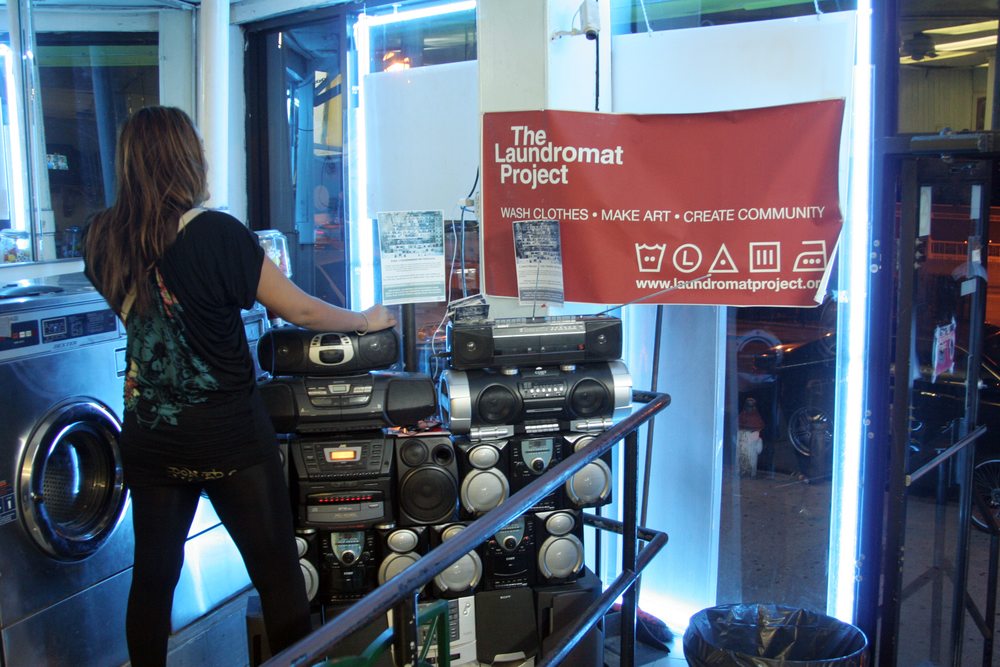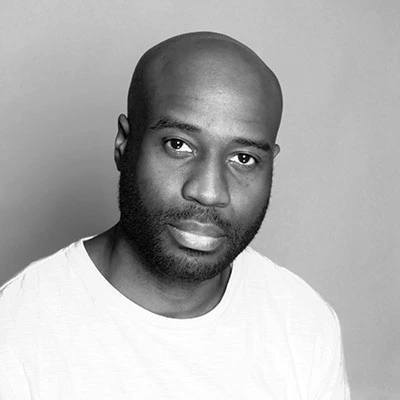We recently caught up with Bayeté Ross Smith, 2010 Create Change Public Artist in Residence, to find out what he’s been up to lately. Read on to find out more!
What have you been working on lately?
Have been working on a collaborative transmedia project called Question Bridge: Black Males, a photography and mixed media project about gun owners called Gatling (America), and I have a video project underway which is about Hip Hop fantasies that I am working on with my cousin Will Sylvester. I am also still photographing high school proms and I have created several other versions of Got The Power: Boomboxes and Community Soundtracks in different locations across the country.
Question Bridge is a collaboration with Hank Willis Thomas, Chris Johnson and Kamal Sinclair. It represents and redefines Black male identity in America, through a video mediated exchange of questions and answers. Ultimately it works to redefine our perceptions of people from all demographics by using Black males as a lens through which to examine very human issues most of us face on a daily basis. Transmedia describes creative projects that utilize multiple platforms to engage their content with viewers. Question Bridge is an art installation, a film for movie theaters, an interactive website (which is still underway), a series of community engagement events and a curriculum for use in elementary, middle schools and high schools. We premiered last year at the 2012 Sundance Film Festival and had dual exhibitions in Brooklyn and Oakland to start the year. The exhibition and film version are currently traveling to museums and film festivals around the world.
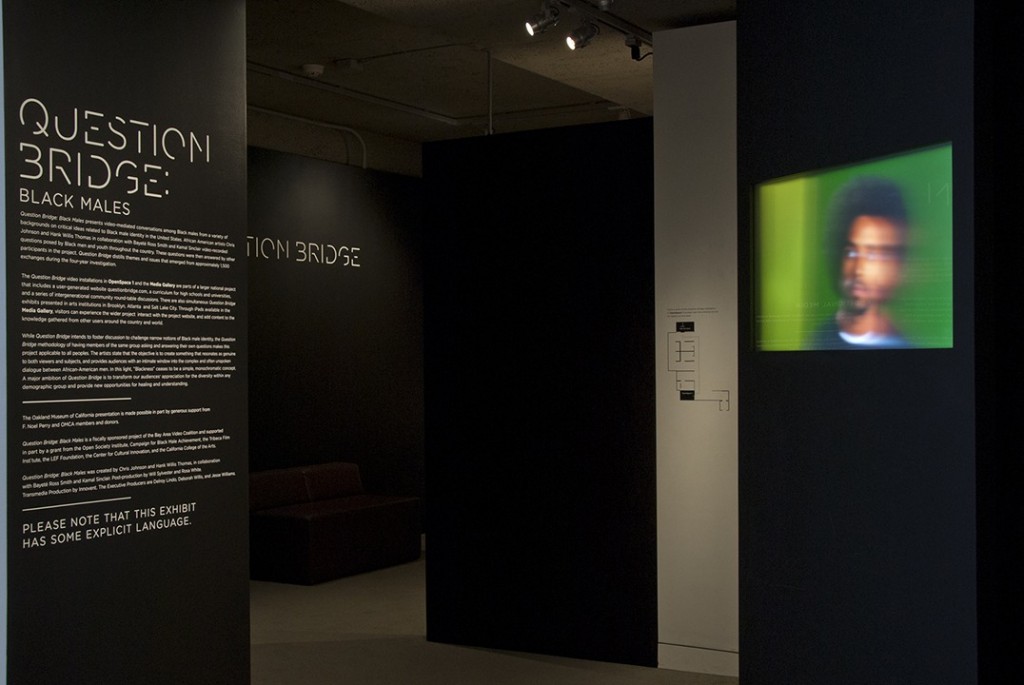
Gatling (America) was inspired by my experience as an American boy, and understanding our love/hate relationship with violence. Violence is part of humanity. It has always existed. What we try to do as “civilized” humans is contain it in acceptable, productive ways. However, much of that is subjective. Weapons have also always existed and thus we have always had to navigate who gets access to which weapons. Lack of access has led to many atrocities, just like access has lead to many atrocities. Guns have also allowed us as humans to really take control over the earth, for better or for worse. As an American boy I grew up playing with water guns, G.I. Joes, Transformers etc. I watched violent cartoons with Bugs Bunny and Tom & Jerry. I loved sports like boxing and football. I watched Kung Fu flicks. I also grew up in the crack cocaine era and was very aware of urban violence that affects Black and Latino youth. So for me, I was curious in examining our relationship with violence through our relationship with guns. I noticed that images of gun owners in popular culture are usually two extremes. A glorified action hero or a deplorable criminal on the news. There wasn’t much in between. I am curious about examining who gun owners truly are, what they look like and their thoughts on gun ownership. My goal is create a more thoughtful and realistic perception of guns, gun owners and the way we live with violence.
What else have you been doing since your residency with The LP?
I’ve been teaching at NYU, the International Center of Photography, Parsons and Kean University. I have created three additional versions of my boom box project, Got The Power, in Minnesota, Alabama and Baltimore.
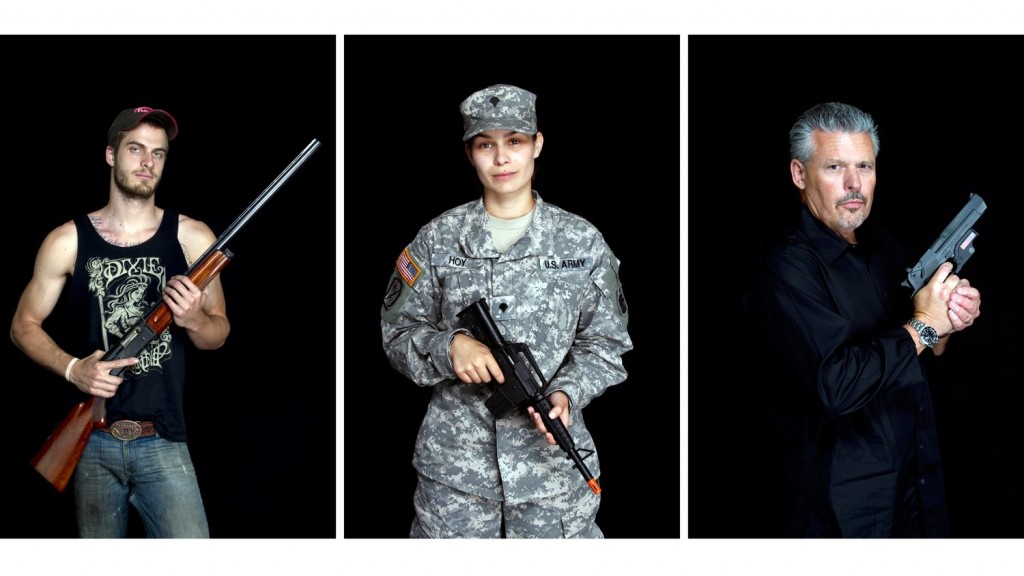
What made you apply for The LP Residency, and how did the residency impact your work as an artist?
I applied for the LP residency because a major part of my work involves social engagement. I believe art needs to interact with people within daily life. It’s cool to do museums and galleries, but if little kids, senior citizens, and everyone in between from various education levels can’t engage with your work, then you’re not doing anything that special. Only certain types of people go to museums and galleries so as artists we have to take initiative to make our work socially engaging. The Laundromat Project was right up my alley in terms of creating art that engages and is activated by the general public, in a space that everyone has access to: the local laundromat.
Can you tell me a little bit about Question Bridge? How did you get involved with this project?
I got involved with Question Bridge when my fellow collaborator Hank Willis Thomas invited me to collaborate on the project. When he told me the basic concept behind the work I knew it was something that, if we did it well, could have a profound impact on people. I had a lot of ideas for the project immediately that I wanted to share with him and our other collaborator Chris Johnson.
And how has it been received so far?
So far Question Bridge has been very well received. Our biggest obstacle is getting people to rethink their bias when they hear “Black males” in the title. Some folks don’t understand how a project examining Black males relates to them. However Black males play such a prominent role in American culture and consciousness that the reality is, everyone has some interest in understanding Black males and Black culture. Question Bridge allows people to witness a conversation between a diverse group of Black men in a way that is comfortable and accessible. If you like popular music, sports, comedy and entertainment, then you have an interest in Black people and Black males. So our challenge is to get people who don’t realize this to understand they can benefit from the experience of seeing Question Bridge.
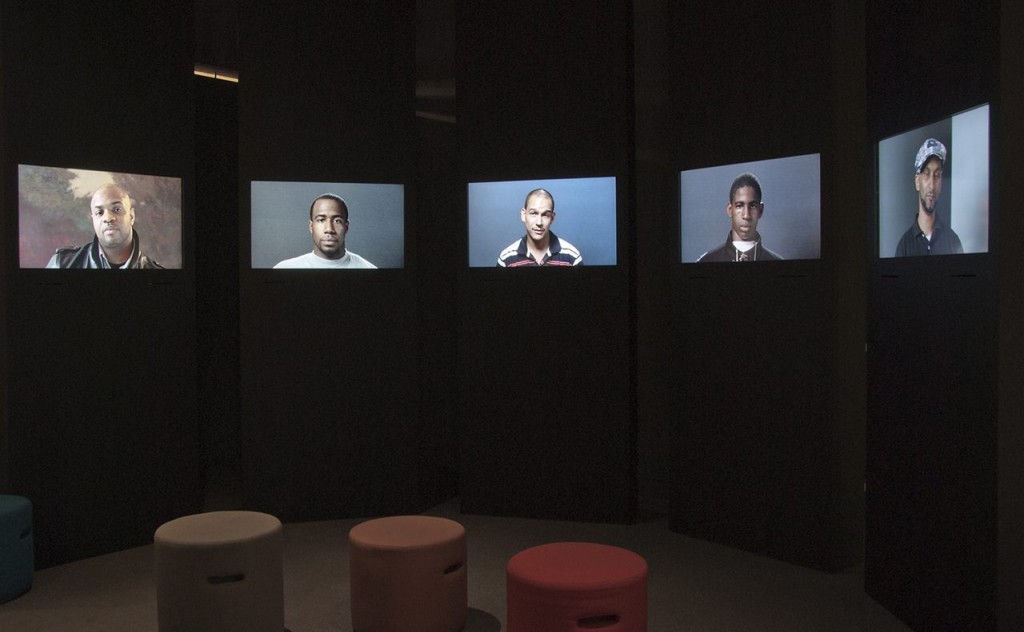
What have you learned from working on Question Bridge?
That the identity of any group of people is not monolithic, but always more diverse and nuanced than any of us can imagine. I’ve been a Black male all my life, went to a Black college, traveled to areas around the world where I could immerse myself in pan African culture and consequently thought I knew most of what there was to know about being a Black male. However my perceptions of Black male identity were consistently redefined throughout the course of working on Question Bridge.
What’s your neighborhood?
Harlem.
Why there?
I’m actually a New Yorker and I grew up in Manhattan. I have personal history in Harlem. I took music lessons at Harlem School of the Arts, learned to swim at the 135th street YMCA, had my first job working for Graham-Windham in that same area and spent a lot of time at the Schomburg as a kid. It’s a neighborhood that has a lot of great history and inspires me. I’ve lived in the Bronx, Queens and Brooklyn and I like living Uptown the best.
What’s your favorite thing about it?
The people.
What is one thing you would change about your neighborhood?
I would change the way it is being gentrified. I mean, gentrification isn’t necessarily a bad thing, but it tends to run amuck these days. Technically I’m a gentrifier. I’m formally educated and have a certain stable economic level. But the way in which no space is really reserved for low income people, many of whom have lived in my neighborhood for years and fought to make it a better place, and once its safe enough to be gentrified they get pushed out… that is not acceptable. I grew up on the Upper West Side and now I could never afford to live in the building I grew up in so I feel this issue in my heart.
Who are your neighbors? How have they influenced your work?
Some of them are regular people. Some are artists. There are a few young professionals. There are some elders and some hood cats. They provide me with a balanced perspective on the various types of people who can live together productively. There are some kids but I don’t know them that well. It’s hard to know kids if you don’t know their parents these days. People think you’re shady if you just talk to them. But it’s pretty balanced group of folks. Multiple backgrounds and income levels. Everyone is very friendly and very genuine.
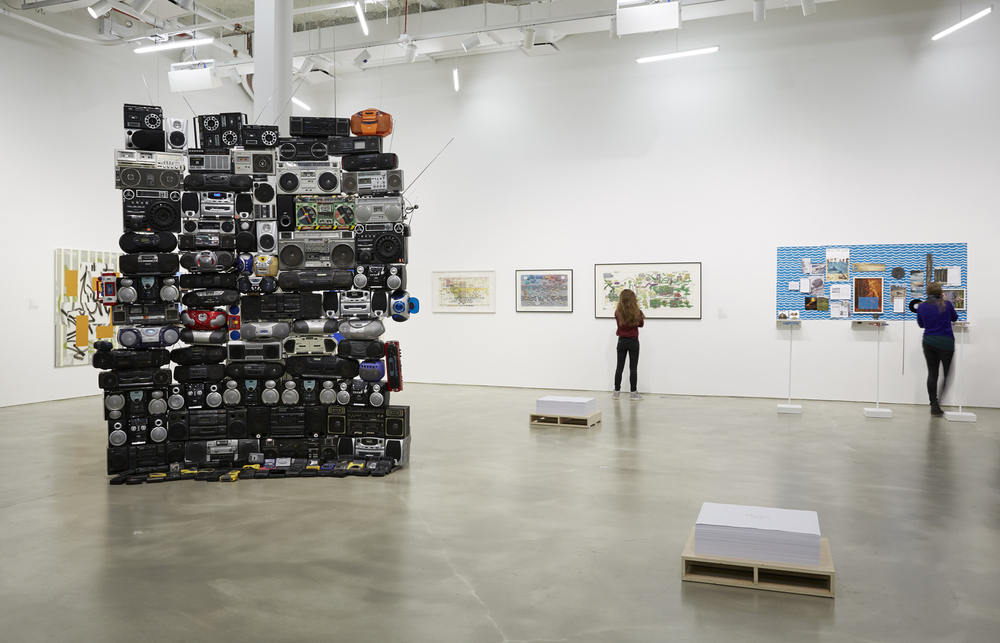
Where do you do your laundry?
My laundromat is down the street from me. It’s a pretty good laundromat. Decent prices, friendly service, fairly nice interior. It’s right next to my dry cleaners and grocery store. Everything is really close by.
What are you reading now?
Just read all of Junot Diaz’s books. Had been meaning to do that for a long time.
What song gets you going when work is hard?
I actually have a playlist of songs that do that. Something with a hard break beat makes me feel unstoppable.
What’s your favorite NYC-themed movie, song, poem, book?
“Do The Right Thing,” “C.R.E.A.M.” by Wu-Tang Clan, “Invisible Man.”
What’s your favorite word, sound, color?
Can’t discuss that in this forum. Ha! Seriously though, my answers to those questions are not appropriate for this forum. Folks will have to ask me in person.
Tell us about an artist who has influenced your work.
Gordon Parks. He did a wide variety of different types of work, from photographs to movies, and made work that touched on our shared human experience in some way that helped people rethink how their ideas about one another.
What does “socially-engaged art” mean to you?
It is work that interacts with a wide range of people within the course of daily life, and deals with common issues and themes in society that affect our shared human experience on some level.
What advice would you offer other artists interested in socially-engaged work?
Spend time in a wide variety of communities and understand that art making isn’t always about you. It is also about interacting with other people. Get involved in communities that force you out your comfort zone. And don’t think your work is too damn special. As Kerry James Marshal once said, every time you show your work you have to earn your audience’s attention.
What will you be working on next?
A video series on Hip Hop fantasies.
Any current or upcoming show/performance you want to recommend?
- Wangechi Mutu, “A Fantastic Journey,” Nasher Museum at Duke
- “White Boys,” curated by Hank Willis Thomas and Natasha Logan, Haverford College, Haverford, PA
- Travis Somerville, “A Great Cloud of Witnesses,” Catherine Clark Gallery, SF, CA
- Michele Pred, “Amendment,” Nancy Hoffman Gallery, NY, NY
Bayeté Ross Smith is an artist, photographer, and educator living in New York City. His collaborative projects “Along The Way” and “Question Bridge: Black Males” have shown at the 2008 and 2012 Sundance Film Festival, respectively. He has also been involved in a variety of community and public art projects with organizations such as the Jerome Foundation, Alternate Roots, The Laundromat Project, the city of San Francisco, the city of Atlanta and the San Francisco Municipal Transit Agency.
